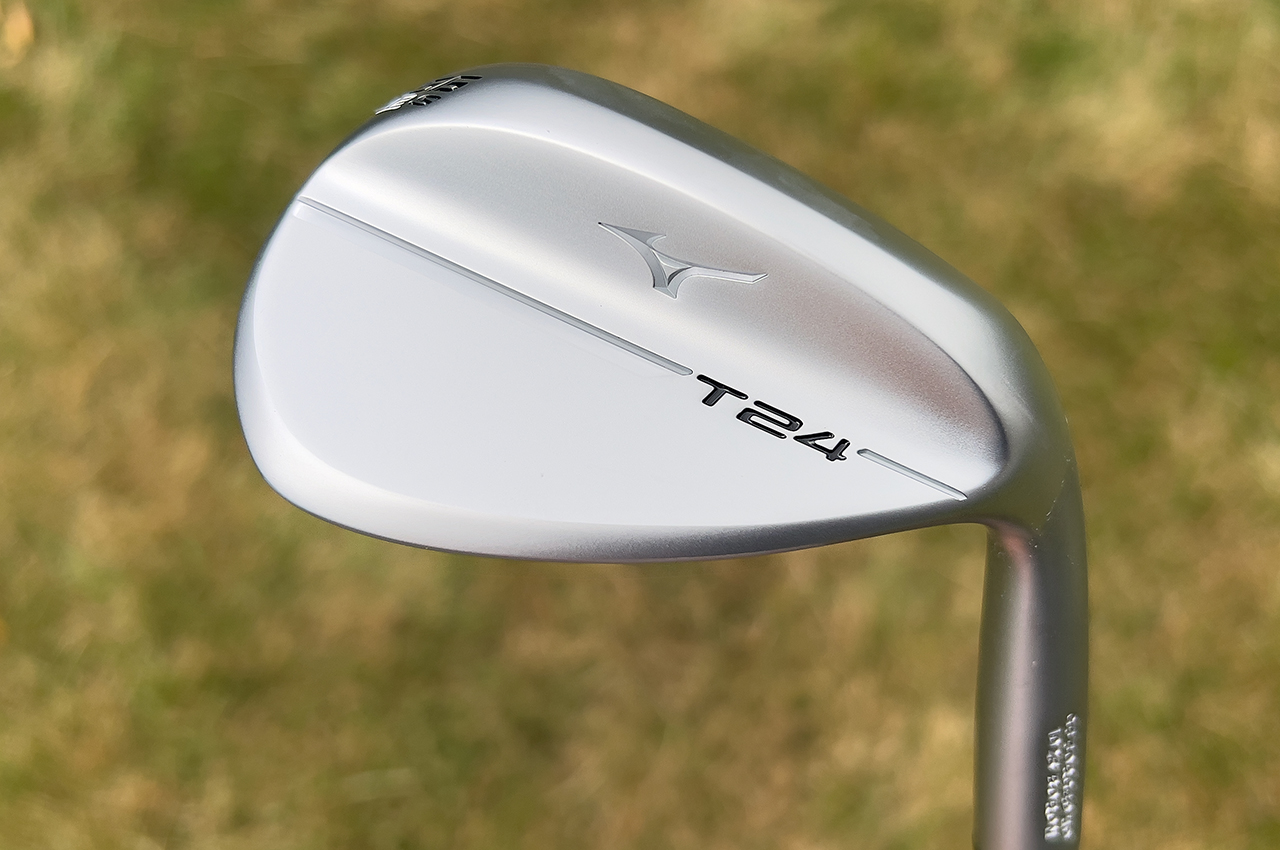Gear: Mizuno T24 wedges
Price: $180 each with True Temper Dynamic Gold Tour Issue S400 shafts and Golf Pride MCC grips
Specs: Forged 1025 carbon steel infused with Boron. Available in even lofts from 46 degrees to 60 degrees in three finishes (Raw, Soft White Satin, Denim Copper) and in five sole configurations.
Available: September 14
Who It’s For: Golfers who love a traditional-looking wedge designed to enhance feel, consistency and spin.
The Skinny: The combination of a thinner topline, shorter blade length, loft-specific grooves and five different sole grinds makes the T24 wedge family the most versatile in the brand’s history.
The Deep Dive: Over the past several seasons, Mizuno has tried several innovative ways to help golfers get better performance around the greens, going so far as to offer the larger, hollow-bodied ES21 wedges. The release of the new T24 wedges blends several different features and design elements in a classic-looking wedge that has been made to appeal to a wide range of players.
The T24 wedges are made using grain flow forged 1025 carbon steel that is infused with Boron. Mizuno has added Boron in some irons since 2014 because it makes the carbon steel harder without sacrificing the soft feel. In wedges, that means the edges of the grooves should be more durable, so spin deterioration will not happen as quickly.
Compared to the T22 wedges they replace, the T24 wedges have a thinner topline and a more compact shape. The pitching wedges and gap wedges (46-52 degrees) have iron-style looks and are slightly-more angular than the sand wedges and lob wedges (54-60 degrees), which have a more-rounded shape. All the T24 wedges and have extra mass designed behind the top of the hitting area to elevate the center of gravity location, which should make it easier to flight approach shots down for more control.

The Mizuno T24 has extra mass located high in the back of the head, but golfers cant’ see it when they address the ball. (David Dusek/Golfweek)
Mizuno was the first manufacturer to design different grooves for different wedges based on their lofts, and that benefit is found in the T24. Pitching wedges and gap wedges (46-52 degrees) have thinner, deeper, iron-style grooves because golfers tend to use those clubs from the fairway as extensions of their iron set. Sand wedges and lob wedges (54-60 degrees), however, get wider, shallower grooves to help channel water and debris off the hitting surface and protect spin. In the T24 wedges, the grooves themselves have been modified to be sharper, to create more spin, while staying in the USGA groove rule restrictions.

Grooves in the Mizuno T24 san wedges and lob wedges are wider and shallower to move water and debris off the hitting surface. (David Dusek/Golfweek)
Mizuno has also changed how many grooves each T24 wedge has, with pitching wedges and gap wedges now having 17 grooves packed tightly on the face while, like an iron. At the same time, the sand wedges and lob wedges have 15 grooves. According to Mizuno, having numerically fewer grooves on the higher-lofted wedges allows them to grab the golf ball’s cover more effectively and generate extra spin.
Between each groove, Mizuno has added a microgroove pattern to increase friction. The microgrooves are under the chrome plating, so you can’t see them, but they are visible on the Raw finished wedges. Keeping the microgrooves under the chrome plating increases their durability.

Mizuno T24 wedges come in five different sole configurations. (David Dusek/Golfweek)
The T24 wedges are available in five different sole grinds, with each designed to excel in different conditions and ideally suited for different styles and shot types.
- S Grind (46-54 degrees): Think of this as a standard, straight sole with some heel relief the S Grind will perform like an extension of a player’s iron set, but the heel relief should allow it to be used on chip shots more effectively.
- D Grind (54-58 degrees): A versatile grind with heel and toe relief and moderate bounce in the center of the sole for players who want traditional versatility around the greens.
- C Grind (56-60 degrees): Thin offering combines the heel and toe relief of the D Grind but with less bounce for players who sweep the ball or who are faced with firm conditions and wet, packed sand.
- X Grind (58-60 degrees): For skilled players, this is the lowest-bounce option among Mizuno’s lob wedges. It has extreme heel and toe relief to help golf clip the ball off tight lies. The X Grind is the widest sole, making it a good option for players who struggle in bunkers.
- V Grind (58-60 degrees): A new grind for Mizuno, the V is a high-bounce option with trailing edge relief. A seam running from heel to toe creates a V-shape on the bottom of the club to help this wedge pop out of sand and turf more easily.
Below are several close-up images of the new Mizuno T24 wedges.

